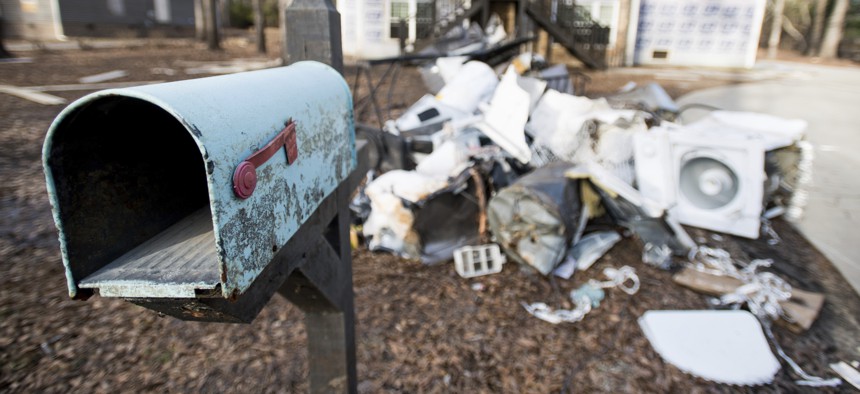Lawmakers Approve Two-Week Flood Insurance Extension

A mailbox stands in front of a a home damaged by flooding from Hurricane Florence near the Crabtree Swamp Friday, Feb. 1, 2019, in Conway, S.C. Sean Rayford/AP Photo

Connecting state and local government leaders
Congress is under pressure to overhaul the National Flood Insurance Program amid cost and coverage concerns, but has been unable to secure permanent reauthorization of the program.
House lawmakers approved a stop-gap measure to keep the National Flood Insurance Program afloat on Thursday, a day before the program was set to expire.
The last-minute action highlights the volatility of the program, and represents the 11th time Congress has temporarily reauthorized the program in the last two years amid failed attempts to substantially overhaul flood insurance and address cost and coverage concerns.
The House approved a two-week reauthorization of NFIP through a unanimous consent agreement on Thursday that will keep the program running until June 14. But Republicans blocked a $19 billion disaster relief bill that included a provision that would have extended the program through September. The House is expected to take up the disaster bill when it reconvenes June 3 and pass it, while President Trump has indicated he will sign the legislation.
NFIP is the primary provider of flood insurance in the United States, covering approximately 5 million policyholders. Facing increased flooding risks and rising costs, lawmakers and policy experts alike have called for an overhaul of the struggling program.
Costs associated with Hurricane Katrina in 2005, Superstorm Sandy in 2012 and Hurricane Matthew in 2016 have severely increased the flood insurance program’s debts, which totaled $20.5 billion at the end of 2018.
“The program can’t function the way it is, it’s just not sustainable,” said Joel Scata, an attorney with the Natural Resources Defense Council.
The House Financial Services Committee held a hearing on proposals to overhaul the flood insurance program in March. And various lawmakers have floated proposals to reshape the program since it expired in 2017. But congressional leaders have not been able to come together to advance any significant reforms.
“We need a long-term reauthorization to provide certainty to homeowners and businesses, and we also need critical reforms to the program,” Committee Chairwoman Maxine Waters said during a speech on the House floor in May. “First and foremost, we must do more to address unaffordable premium costs for low-income households, address the program’s debt, which is unfairly burdening policyholders with millions of dollars in interest, and lower costs and fees on policyholders.”
Thursday’s passage of the stop-gap measure comes just before the start of Atlantic hurricane season, which begins Saturday.
Sen. John Kennedy, the Louisiana Republican who sponsored the two-week flood insurance extension, praised the bill’s approval but urged passage of the $19 billion disaster aid package to ensure the program’s viability through the duration of hurricane season.
“The NFIP is a safety net for millions of Americans, and we could not afford to let it lapse,” Kennedy said. “This is another short-term fix, but it buys us two weeks to keep the program functioning until we can pass a longer extension.”
Uncertainty about the future of the flood insurance program, as well as the possibility of future lapses in coverage, could contribute to instability in the housing market, experts say.
Individuals who obtain federally-backed mortgages to purchase property located within 100-year floodplains are required to have flood insurance. A lapse in the program means new policies cannot be written and existing policies cannot be renewed, creating disruptions in the housing market and potentially putting property owners at risk if a flood were to occur during a lapse in coverage, said Jessica Hall, federal legislative director at the National Association of Home Builders.
“Anything that is turbulent is going to have a ripple effect,” Hall said.
While Congress has struggled to overhaul and permanently reauthorize the flood insurance program, the Federal Emergency Management Agency, which administers the program, has begun moving ahead with its own reforms. FEMA announced a new risk rating measurement program in March that the agency said would better reflect a property’s flood risk.
According to Bloomberg News, the rating assessment would “tie premiums to the actual flood risk facing individual homes nationwide starting in October 2020.”
Andrea Noble is a Staff Correspondent for Route Fifty.

NEXT STORY: A New Way for Firefighters to Track Their Exposure to Carcinogens




